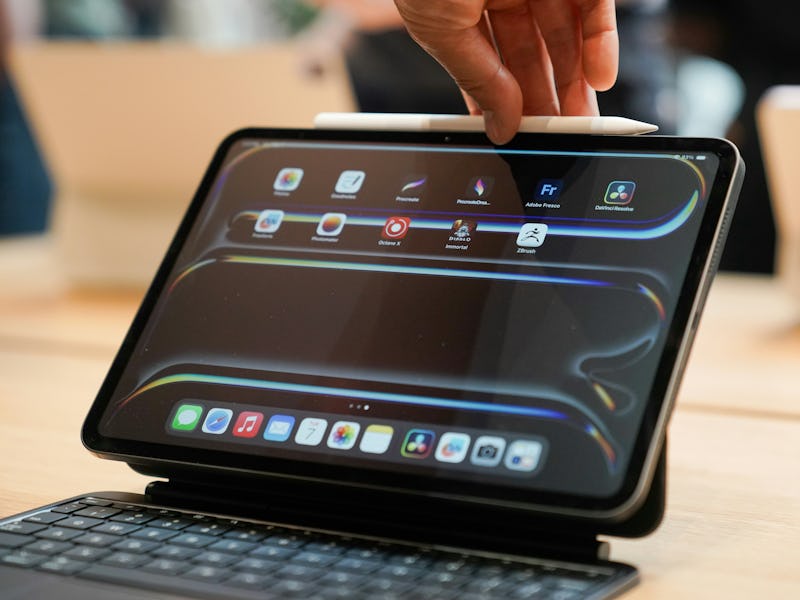12 Important Details Apple Conveniently Forgot to Tell You About the New iPad Pros
You might want to make sure you understand these hidden changes before you pull the trigger on a new iPad.

New iPad Pros are here, and while Apple has done a solid job illuminating the headlining upgrades like a new M4 chip, OLED displays, and new accessories, there are a few things — pretty damn important ones — that slipped through the cracks at its Let Loose event.
It took some digging through iPad Pro spec sheets and X to discover some of these changes — different versions of the M4 chips and the lack of an ultrawide camera to name a couple — but we’ve compiled all the important details to know before you upgrade on May 15.
1. 10-Core CPU Reserved for At Least 1TB
You might not feel a difference between these M4 chips, but you should know about it.
To make its iPad lineup even more confusing, the latest Pro models have differences in the M4 chips depending on the storage option. If you buy the new iPad Pro with 256GB or 512GB of storage, you get an M4 chip with a nine-core CPU with three performance cores. If you go for the more expensive 1TB and 2TB options, you get a bump up to a 10-core CPU with four performance cores instead.
2. More RAM for 1TB/2TB Models
More RAM means better performance when it comes to certain apps, like Final Cut Pro.
Making the performance gap between the storage options worse, the 256GB and 512GB models only get 8GB of RAM. At the top end of the lineup, the 1TB and 2TB options get double that with 16GB of RAM.
3. Nano-Texture Display Limited to 1TB+ Models
The differences aren’t limited to the internals.
On top of the performance disparities, you can only get the Nano-texture display with the 1TB and 2TB iPad Pros. For those of us who don’t want that much storage, we’re stuck with the plain old “standard glass” option.
4. LTPO Displays But No Always-On
We’re getting better displays with the iPad Pro, but not one with the Always-On feature.
Apple upgraded its iPad Pro to LTPO displays, which are more power efficient and allow for adaptive refresh rates going as low as 10Hz. Still, this isn’t enough for Apple to do its Always-On display that we see with the latest iPhone and Apple Watch.
5. One Less Microphone
Apple has dropped its iPad Pro down to four mics.
Compared to its predecessor, the 2024 refresh for the iPad Pro will have four “studio-quality” mics compared to five. You may only notice this when you’re doing voice calls or recordings, but this may have to do with how thin and lightweight the new iPad Pros are.
6. Incompatible With Apple Pencil 2
The latest iPad Pro only works with the new Apple Pencil Pro and the older USB-C version of the stylus.
If you want to pair a stylus with the new iPad Pro, you’re limited to the latest Apple Pencil Pro or USB-C model. The older Apple Pencil 2 won’t work with the iPad Pro’s reorganization with its magnetic connection and landscape camera.
7. No mmWave 5G Compatibility
The iPad Pro’s Wi-Fi and Cellular models now only get sub‑6GHz 5G.
Hidden deep in the iPad Pro’s tech specs page, you’ll see that the iPad Pro no longer supports mmWave 5G and only sub-6GHz 5G. In simpler terms, that means that we don’t get access to the faster mmWave 5G frequencies that have less latency but travel shorter distances.
8. No Physical SIM slot
Physical SIM cards may become a relic of the past.
The cellular models of the iPad Pro have done away with the physical SIM card slot. Apple instead wants to embrace eSIMs with the updated iPad lineup, following a similar switch with the iPhone as early as the 14.
9. No More Ultra Wide Camera
It might be a little harder to squeeze everyone in frame now.
With the rear camera housing, Apple has completely removed the 10-megapixel Ultra Wide camera and left us with only the 12-megapixel Wide camera. Apple says the new iPad Pro has an even better Wide camera with better color and low-light performance, but it still feels like an overall downgrade.
10. New Location for Ambient Light Sensor
That’s not the only shuffling around Apple did with its camera housing since that’s where the ambient light sensor is now found. This is supposed to help your iPad Pro automatically adjust brightness better by detecting the lighting conditions around you.
11. No More Included Stickers
There are still plenty of Apple stickers to go around.
As part of Apple trying to meet its environmental goals for less plastic in its packaging, we have to bid farewell to those logo stickers included in Apple product purchases. It’s a worthwhile objective, but you can still ask for a sticker with your purchase at the Apple Store if you really want one.
12. No More Chargers in Some Countries
Hopefully you have some of these lying around still.
Customers in certain European Union member countries and the U.K. will no longer get a USB-C adapter that plugs into the wall. Like the sticker exclusion, we think this has to do with Apple trying to meet its environmental goals. It could also line up with the EU’s rules on “waste from electrical and electronic equipment,” as pointed out by 9to5Mac.